The titans of global capitalism are exploiting the Covid-19 crisis to institute social credit-style digital ID systems across the West.
The death by starvation of Etwariya Devi, a 67-year-old widow from the rural Indian state of Jharkhand, might have passed without notice had it not been part of a more widespread trend.
Like 1.3 billion of her fellow Indians, Devi had been pushed to enroll in a biometric digital ID system called Aadhaar in order to access public services, including her monthly allotment of 25kg of rice. When her fingerprint failed to register with the shoddy system, Devi was denied her food ration. Throughout the course of the following three months in 2017, she was repeatedly refused food until she succumbed to hunger, alone in her home.
Premani Kumar, a 64-year-old woman also from Jharkhand, met the same demise as Devi, dying of hunger and exhaustion the same year after the Aadhaar system transferred her pension payments to another person without her permission, while cutting off her monthly food rations.
A similarly cruel fate was reserved for Santoshi Kumari, an 11-year-old girl, also from Jharkhand, who reportedly died begging for rice after her family’s ration card was canceled because it had not been linked to their Aadhaar digital ID.
These three heart-rending casualties were among a spate of deaths in rural India in 2017 which came as a direct result of the Aadhaar digital ID system.
With over one billion Indians in its database, Aadhaar is the largest biometric digital ID program ever constructed. Besides serving as a portal to government services, it tracks users’ movements between cities, their employment status, and purchasing records. It is a de facto social credit system that serves as the key entry point for accessing services in India.
Having branded Aadhaar’s creator, fellow billionaire Nandan Nilekani, as a “hero,” initiatives backed by tech oligarch Bill Gates have long sought to bring the “Aadhaar approach to other countries.” With the onset of the Covid-19 crisis, Gates and other mavens of the digital ID industry have an unprecedented opportunity to introduce their programs into the wealthy countries of the Global North.
For those yearning for an end to pandemic-related restrictions, credential programs certifying their vaccination against Covid-19 have been marketed as the key to reopening the economy and restoring their personal freedom. But the implementation of immunity passports is also accelerating the establishment of a global digital identity infrastructure.
As the military surveillance firm and NATO contractor Thales recently put it, vaccine passports “are a precursor to digital ID wallets.”
And as the CEO of iProove, a biometric ID company and Homeland Security contractor, emphasized to Forbes, “The evolution of vaccine certificates will actually drive the whole field of digital ID in the future. So, therefore, this is not just about Covid, this is about something even bigger.”
For the national security state, digital immunity passports promise unprecedented control over populations wherever such systems are implemented. Ann Cavoukian, the former privacy commissioner of Ontario, Canada has described the vaccine passport system already active in her province as “a new, inescapable web of surveillance with geolocation data being tracked everywhere.”
For tech oligarchs such Bill Gates and neoliberal institutions such as the World Economic Forum, digital ID and digital currency systems have already enabled the extraction of unbelievable profits in the Global South, where hundreds of millions of people remain “unbanked” and therefore outside the sphere of electronic payments systems.
Now, with grassroots protest building against an exclusionary regime of vaccine passports, the captains of global capitalism are campaigning with more urgency than ever to bring digital ID to the West.
For these elite interests, the digitization of immunity passports represent a critical tool in a long-planned economic and political transformation.
“With no Covid Pass, my wife and I are banished from society”
Across the globe, the certification of vaccination against COVID-19 is already a requirement to participate in daily life.
In Indonesia, COVID-19 vaccines are mandatory, and those who refuse may face fines or be refused access to public services. In Greece, residents must present immunity to work in or enter bars, theaters, and other indoor public spaces.
France has similarly required residents to carry a health pass for access to all restaurants, bars, trains, and any venue accommodating more than 50 people, a decision that has stoked widespread protests throughout the country. The socialist French former presidential candidate Jean-Luc Mélenchon has blasted the new restrictions as “absurd, unfair and authoritarian.”
Italy has mandated its Green Pass for all workers, threatening them with termination from jobs and suspension of pay. Italy also requires the pass to use Italian public transit. Scenes of private security over-enforcement of the Green Pass and the exclusion of Italy’s elderly from vital services have already begun to go viral on social media.
Restrictions for Lithuanians who are not double vaccinated or unable to demonstrate recent prior infection from Covid-19 represent some of the harshest in the world. They are banned from restaurants, all non-essential stores, shopping centers, beauty services, libraries, banks or insurance agencies, universities, inpatient medical care, and train travel.
Gluboco Lietuva, a self-described “Lithuanian father” who has refused vaccination, stated on Twitter: “With no Covid Pass, my wife and I are banished from society. We have no income. Banned from most shopping. Can barely exist.”
Four out of ten Canadian provinces currently require citizens to show proof of vaccination against COVID-19 to enter indoor public venues like restaurants and theaters. All federal public servants and some other workers must be vaccinated to keep their jobs.
The government of Canadian Prime Minister Justin Trudeau also requires all air travelers and interprovincial train travelers to be vaccinated. Canada’s Alberta province took the measures a step further this September when it announced that those who cannot prove full COVID vaccination will no longer be allowed to socialize indoors in groups of more than 12.
In Israel, meanwhile, only those who have received three doses can work or shop indoors and go to restaurants; citizens who received two shots over six months ago are now considered unvaccinated. This rule has consolidated what even the New York Times has deemed a “two-tier system for the vaccinated and unvaccinated … raising legal, moral and ethical questions.”
In the US, President Joe Biden is “moving forward with vaccination requirements wherever [he] can.” Biden, who declared that his “patience is wearing thin” with unvaccinated Americans, recently announced new federal requirements mandating that about 80 million Americans – including all those who work at companies with more than 100 employees – must either be vaccinated or get tested for COVID-19 weekly.
Biden has also mandated that those working at facilities which receive Medicare or Medicaid must show proof of immunity to keep their jobs. According to AP, President Biden is considering proof of immunity for interstate travel, a restriction his former public health advisor, Ezekiel Emanuel, has clamored for.
In the state of Colorado, the UCHealth hospital system has announced that it will not allow organ transplants to be performed on unvaccinated patients, prompting some to travel to Texas for life-saving procedures.
New York City offers a glimpse of the program in store for the rest of the country. The city’s “Key to NYC” requirement, which went into effect September 13, requires proof of vaccination to work at or attend indoor dining, indoor fitness, and entertainment venues like museums, stadiums, arcades, and theaters.

“If you want to participate in our society fully, you’ve got to get vaccinated,” Mayor De Blasio stated. “[New York City] is a miraculous place literally full of wonders … if you’re un-vaccinated, unfortunately, you will not be able to participate.”
COVID-related mandates could be permanent
While outlets like CNN have referred to vaccine passports as a “useful, temporary measure,” it is increasingly evident that the proof of immunity restrictions imposed on Western populations may not go away any time soon.
Australia’s New South Wales Ministry of Health Dr. Kerry Chant has stated that citizens “need to get used to being vaccinated with COVID vaccines for the future… it will be a regular cycle of vaccination and revaccination.”
Albert Bourla, CEO of the Pfizer corporation that has seen its stock skyrocket during the pandemic, remarked that the “most likely scenario” is coronavirus vaccine shots mandated on an annual basis.
As a February Nature headline read, “the coronavirus is here to stay.” Or, as Dr. Mike Ryan, Executive Director of the World Health Organization’s (WHO) Health Emergency Program, put it: it is “very, very, unlikely” that COVID-19 will ever go away.
“Eradicating this virus right now from the world is a lot like trying to plan the construction of a stepping-stone pathway to the Moon,” said Michael Osterholm, an epidemiologist at the University of Minnesota in Minneapolis. “It’s unrealistic.”
“This is our life from now, in waves,” Israel’s Coronavirus Czar, Salman Zarka, acknowledged.
Already, Zarka has prepared plans to mandate a fourth dose for Israelis.
COVID mandates to be digitally enforced
While a state-mandated treadmill of boosters may seem unappealing to many, if not outright hellish, for others the nightmare presents the opportunity of a lifetime. As early as May 2020, only seven weeks after the pandemic was declared, US tech billionaire Bill Gates predicted that “eventually we will have some digital certificates to show who has recovered or been tested recently or when we have a vaccine who has received it.”
Now, over a year later, a growing number of local and national governments require some form of digital proof of vaccination or natural immunity against COVID-19.
Those who want to travel to Canada, for example, are required to download an app that verifies the vaccination status of incoming travelers. The government also plans to introduce a federal, Canada-wide digital vaccine passport in the coming months.
When the European Union (EU) opened up to foreign tourists this summer, it introduced a “Digital COVID Certificate” which granted entry to those vaccinated against COVID-19, those who have had a negative test, or those who recently recovered from an infection. Its proposed “Digital Green Certificate” has been branded as a means to facilitate safe free movement inside the EU during the pandemic.
The government of France is partnering with a biometric technology company called IDEMIA to “make it easier for its citizens to prove their identity and complete online transactions using a smartphone.” The new app will “enable French citizens to place their national electronic identification cards [introduced to France as a COVID-19 response in August 2021] … on the back of their smartphones and have their identity instantly confirmed.” IDEMIA is also helping France certify travelers immunity data with their Health Travel Pass suite.
The US is still accepting paper vaccination records, and President Biden has insisted no national app is in the works. However, seven U.S. states (California, New York, Louisiana, Colorado, Illinois, New Jersey, and Hawaii) have already implemented apps certifying vaccination against COVID-19 and have various degrees of COVID-19 vaccine mandates in place.
ImmunaBand, a wearable wristband, whose company mission is “to bring the world a little closer in a time of the COVID-19 pandemic and for you to demonstrate to the world your vaccination status,” has also been approved by New York City as proof of vaccination.

“In typical American fashion, the US government is relegating the creation of digital vaccination certifications to the private sector,” stated the non-profit Data & Society.
Indeed, behind the push for digital vaccine passports is a coterie of supra-national neoliberal institutions guided by oligarchic tech industry donors.
Elite corporate interests behind digital COVID passports
Mega-corporations, international finance institutions, and billionaire-backed private foundations have played a vital role in lobbying for and implementing digital immunity passports.
The burgeoning global health passport system has been coordinated under the umbrella of the UN’s World Health Organization (WHO). However, this institution is so intertwined with wealthy private interests it can hardly be characterized as a “public” health body.
As former WHO director Margaret Chan told filmmaker Lilian Franck, “only 30 percent of my budget is predictable funds. The other 70 percent, I have to take a hat and go around the world to beg for money. And when they give us the money, [it] is highly linked to their preferences, what they like.”
Chief among those private funders is the second wealthiest man in the world, Bill Gates, and his Bill and Melinda Gates Foundation, which happens to be the second largest donor to the WHO.
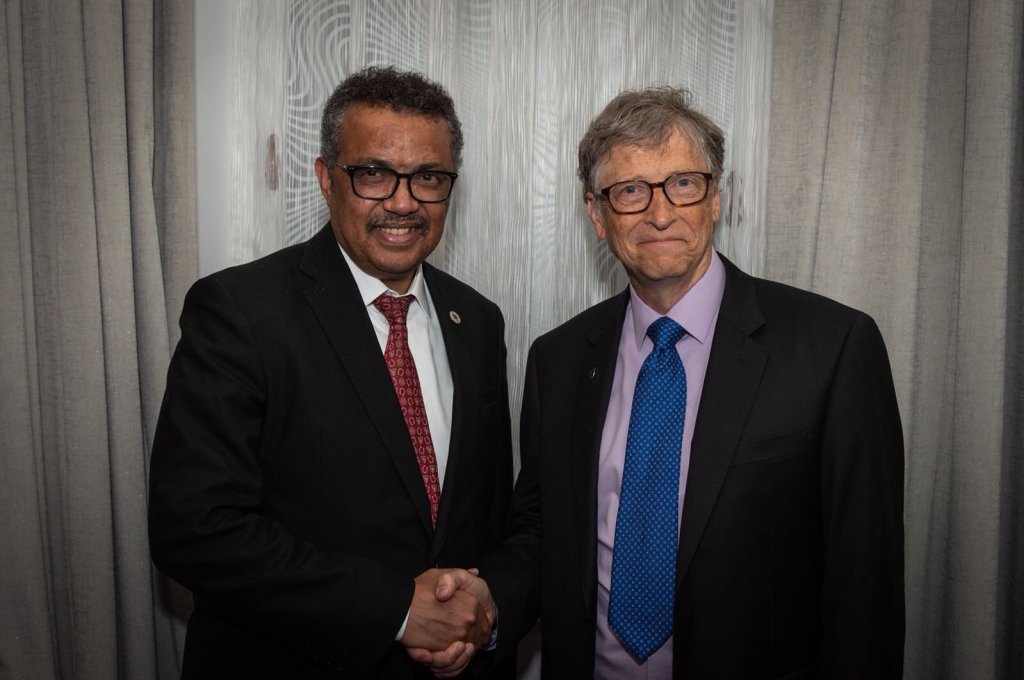 Bill Gates with World Health Organization Tedros Adhanom ” data-medium-file=”https://i1.wp.com/thegrayzone.com/wp-content/uploads/2021/10/gates-tedros.jpeg?fit=300%2C199&ssl=1″ data-large-file=”https://i1.wp.com/thegrayzone.com/wp-content/uploads/2021/10/gates-tedros.jpeg?fit=1024%2C680&ssl=1″ />
Bill Gates with World Health Organization Tedros Adhanom ” data-medium-file=”https://i1.wp.com/thegrayzone.com/wp-content/uploads/2021/10/gates-tedros.jpeg?fit=300%2C199&ssl=1″ data-large-file=”https://i1.wp.com/thegrayzone.com/wp-content/uploads/2021/10/gates-tedros.jpeg?fit=1024%2C680&ssl=1″ />The Gates Foundation recently helped fund a WHO paper providing “implementation guidance” for proof of vaccination certifications across the world. The authors crafted the paper alongside the Rockefeller Foundation and with guidance from several high-level representatives of the World Bank.
According to Foreign Affairs, “few policy initiatives or normative standards set by the WHO are announced before they have been casually, unofficially vetted by Gates Foundation staff.” Or, as other sources told Politico in 2017, “Gates’ priorities have become the WHO’s.”
Also at the forefront of the shift to digital credentials is the World Economic Forum (WEF). “The Forum is involved in the WHO task force to reflect on those [vaccine credential requirements] standards and think about how they would be used,” reads a May WEF article.
On paper, the WEF (also known as the International Organization for Public-Private Cooperation) is an NGO and think tank “committed to improving the state of the world.” In reality, it is an international network of some of the wealthiest and most influential people on the planet. The Forum positions itself as the thought leader of global capitalism.
The organization is best known for its annual gathering of the global ruling class. Each year, hedge fund managers, bankers, CEOs, media representatives, and heads of state gather in Davos to “shape global, regional and industry agendas.” As Foreign Affairs put it, “the WEF has no formal authority, but it has become the major forum for elites to discuss policy ideas and priorities.”
In 2017, German economist and WEF founder Klaus Schwab introduced the concept of “The Fourth Industrial Revolution” with the title of the book he published that year. The Fourth Industrial Revolution (4IR) denotes the current “technological revolution” that is changing the way people “live, work, and relate to one another,” and with implications “unlike anything humankind has experienced,” according to Schwab.
For him, the 4IR is the “merging of the physical, digital and biological worlds.” Schwab has even said that the 4IR will inevitably veer into trans-humanism, or human genome editing.
In January 2021, several WEF partners, including Microsoft, Oracle, Salesforce, and several other “heavyweights,” announced a partnership to launch the Vaccine Credential Initiative (VCI) to develop digital immunization authentication tools, according to Forbes.
Aiming to institute a single “SMART Health Card” for the world, the VCI intends for its SMART Health Cards to be recognized “across organizational and jurisdictional boundaries.”
In the US, some states are already deploying the SMART Health Cards developed by the VCI. These SMART Health Cards have laid the basis for a de-facto national standard for vaccine credentials.
“If enough states embrace the technology, it could become a de facto nationwide standard and relieve the Biden administration of having to lay out federal requirements for domestic purposes,” Politico noted.
The latest version of Apple’s iOS, iOS 15, even includes SMART Health Card support.
As of today, those who received a vaccine in California, Hawaii, Louisiana, New York, Virginia, or certain counties in Maryland can obtain a SMART Health Card from the state.
In most other states, a SMART Health Card is available to those who were vaccinated at one of more than 17,100 CVS, Walgreen’s, or Rite Aid pharmacy chains nationwide.
“More states, pharmacies, and health systems will begin issuing SMART Health Cards very soon,” promises the site of the Commons Project, one of the founders of the VCI initiative.
Commons Project CEO Paul Meyer happens to be a WEF “young leader.”
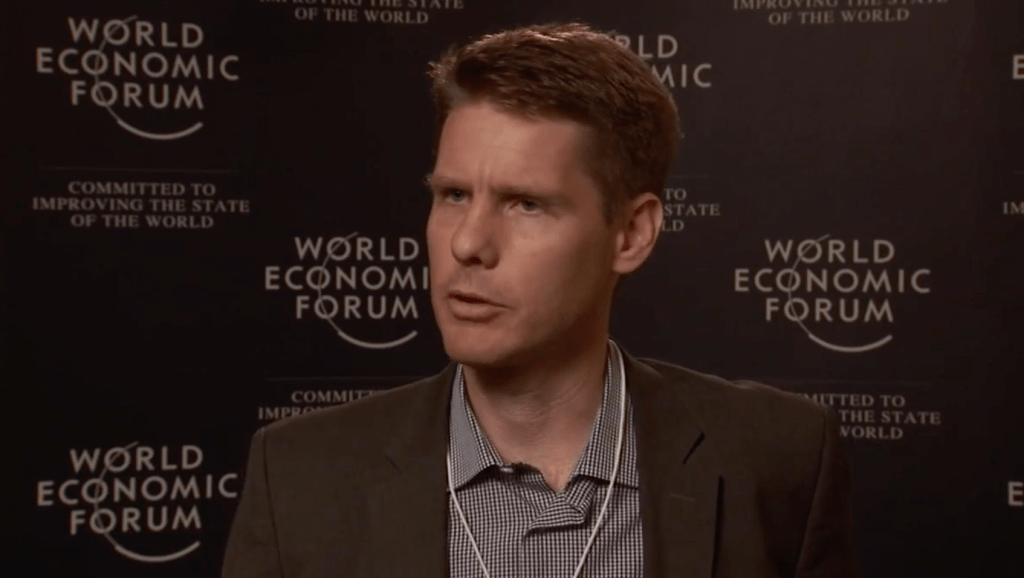 Commons Project CEO and World Economic Forum Young Leader Paul Meyer ” data-medium-file=”https://i0.wp.com/thegrayzone.com/wp-content/uploads/2021/10/PAULMEYERwef.png?fit=300%2C169&ssl=1″ data-large-file=”https://i0.wp.com/thegrayzone.com/wp-content/uploads/2021/10/PAULMEYERwef.png?fit=1024%2C578&ssl=1″ />
Commons Project CEO and World Economic Forum Young Leader Paul Meyer ” data-medium-file=”https://i0.wp.com/thegrayzone.com/wp-content/uploads/2021/10/PAULMEYERwef.png?fit=300%2C169&ssl=1″ data-large-file=”https://i0.wp.com/thegrayzone.com/wp-content/uploads/2021/10/PAULMEYERwef.png?fit=1024%2C578&ssl=1″ />In India, tech oligarchs use digital ID to force social credit on rural poor, spawning exclusion and even death
In 2015, The Gates Foundation provided seed money to a Yale School of Public Health project that would become known as Khushi Baby. Now a non-profit, Khushi Baby makes microchip-equipped necklaces for a child to wear at all times to track their vaccination status and establish continuous monitoring from their first immunizations through adulthood. The non-profit says it is now using data from over 35,000 villages in India to create algorithms that “predict health outcomes for mothers and children.”
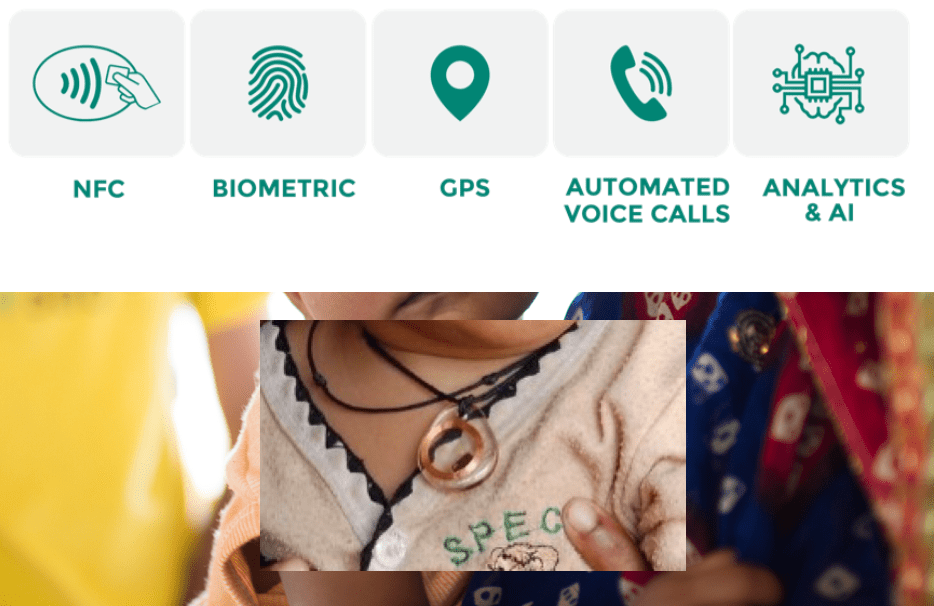 From the website of KhushiBaby.org ” data-medium-file=”https://i1.wp.com/thegrayzone.com/wp-content/uploads/2021/10/khushi-baby.png?fit=300%2C195&ssl=1″ data-large-file=”https://i1.wp.com/thegrayzone.com/wp-content/uploads/2021/10/khushi-baby.png?fit=934%2C606&ssl=1″ />
From the website of KhushiBaby.org ” data-medium-file=”https://i1.wp.com/thegrayzone.com/wp-content/uploads/2021/10/khushi-baby.png?fit=300%2C195&ssl=1″ data-large-file=”https://i1.wp.com/thegrayzone.com/wp-content/uploads/2021/10/khushi-baby.png?fit=934%2C606&ssl=1″ />In 2016, IDEMIA, the security firm now working with the French government on vaccination and identity verification, designed the microchip-equipped necklaces. The necklaces have been used to track health data for 13 million people in India since the beginning of the pandemic.
These programs have been marketed by corporate consultants as essential tools for improving equality and inclusion in the Global South. “Digital identification is key to inclusive growth,” claimed McKinsey, the global consulting firm, in 2019.
“Something like 1 billion people could be more financially included and participative,” said Mike Kubzansky, managing partner of Ebay founder and media mogul Pierre Omidyar’s Omidyar Network during a WEF panel exploring how “Digital Identification Provides a Significant Opportunity for Value Creation.”
Like Gates, Omidyar is heavily invested in the advancement of digital ID and currency systems through his Omidyar Network, which collaborates with the World Economic Forum on the Good ID initiative.
A closer look at the push for “inclusion” by corporate behemoths reveals their altruistic language as little more than public relations cover for raw profit motives, resulting in marginalization and even death for many of those roped into their digital ID systems.
Besides serving as the staging ground for the Khushi Baby venture, India has become a laboratory for digital tracking and identity systems. With support from Western capitalist outfits like the Gates Foundation and the World Bank, the country has become the site of the world’s largest digital ID database, known as Aadhaar.
The Aadhaar system is named for a 12 digit number that serves as a proof of identity and address, among other markers, anywhere in India. To date, a whopping 1.3 billion Indians have been enrolled in the system, making it the largest biometric ID database ever constructed. It contains iris scans and fingerprints from both hands of each user. The technology for this system was provided by none other than the French security firm IDEMIA.
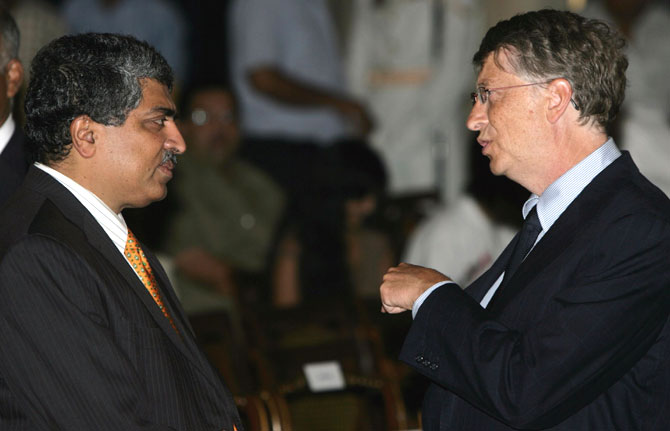 Nandan Nilekani, mastermind of the Aadhar digital ID system, with Bill Gates ” data-medium-file=”https://i0.wp.com/thegrayzone.com/wp-content/uploads/2021/10/nandan-nilekani-bill-gates-lf.jpg?fit=300%2C193&ssl=1″ data-large-file=”https://i0.wp.com/thegrayzone.com/wp-content/uploads/2021/10/nandan-nilekani-bill-gates-lf.jpg?fit=670%2C431&ssl=1″ />
Nandan Nilekani, mastermind of the Aadhar digital ID system, with Bill Gates ” data-medium-file=”https://i0.wp.com/thegrayzone.com/wp-content/uploads/2021/10/nandan-nilekani-bill-gates-lf.jpg?fit=300%2C193&ssl=1″ data-large-file=”https://i0.wp.com/thegrayzone.com/wp-content/uploads/2021/10/nandan-nilekani-bill-gates-lf.jpg?fit=670%2C431&ssl=1″ />Aadhaar was implemented in 2014, the year that the free marketeering, tech-centric Narendra Modi entered the prime minister’s office. Its creator, tech billionaire Nandan Nilekani, has been branded “the Bill Gates of Bangalore,” celebrated by globalization enthusiasts like Thomas Friedman, and hailed by none other than Gates as an altruistic “hero.” Gates’ foundation has collaborated with Nilekani through its “Co-impact” project alongside billionaire eBay co-founder Jeffrey Skoll’s Skoll Foundation.
“Aadhaar is a huge asset for India,” effused Gates in a 2019 interview with the Indian network Times Now. “The fact that you can make digital payments and open a bank account so easily, India is a leader in that. There are huge benefits in being able to get digital government money to the beneficiary.”
But behind the neoliberal spin, Nilekani’s Aadhar digital ID system has wreaked havoc on the lives of India’s most vulnerable and stigmatized populations.
In the eastern Indian state of Jharkhand, a wave of deaths took place in 2017 when impoverished citizens were cut off from government-subsidized food rations by the Aadhaar system. In several cases, aging widows were denied rice for several months because the system rejected their fingerprint scans.
Around the same time, three brothers died of starvation after they failed to properly register with Aadhaar and were subsequently denied rations for six months. The same cruel fate was visited on the Kumari family, which was unable to obtain an electronic Aadhaar ID, lost its ration card, and saw its 11-year-old daughter, Santoshi, die of hunger.
“Many people in Jharkhand have been victims of similar deprivation of food entitlements during the last few months,” reported India’s Scroll. “The main reason is that Aadhaar-based biometric authentication is now compulsory in about 80% of ration shops in the state.”
According to Scroll, a random sample of 18 villages where biometric authentication was compulsory found that a staggering 37% of cardholders were unable to buy their food rations.
Besides making Aadhaar the key to obtaining government services, the Modi government has integrated data collected by Aadhar to establish a “360-degree database” that “automatically track[s] when a citizen moves between cities, changes jobs, or buys a new property,” according to the Huffington Post.
When Covid-19 first reached India in early 2020, Nilekani proposed employing Aadhar as the basis for an anti-Covid vaccination and tracking program. “We must ensure that everybody gets a digital certificate with the date of vaccination, name of the vaccine and through which vendor and at what location,” he declared in 2020.
Unsurprisingly, Nilekani’s system of mass surveillance has proven much more effective at harvesting data than it has been at protecting it. In 2018, the Indian Tribune newspaper was able to purchase the personal information of nearly every Aadhaar user through anonymous sellers over WhatsApp. The process took only 10 minutes and cost about $6 USD, the paper reported.
The system’s serial breaches of privacy even prompted some HIV-positive Indians to drop out of antiretroviral treatment programs that require the Aadhaar card. Though the Aadhaar is said to be voluntary, individuals with HIV have complained to Indian media that they were pressured into enrolling into the ID program, and had been threatened with the loss of medical services.
US privacy advocates have pointed to digital national identity programs like Aadhaar as gargantuan surveillance tools that establish the basis for a social credit system.
Addressing the US House Committee on Financial Services in July 2021, Elizabeth Renieris of Notre-Dame’s Technology Ethics Lab warned, “The Aadhaar number in India is able to track your activity across all facets of your life, from employment to healthcare, to school, to pretty much everything you do. You can’t retain autonomy over specific domains of your life. You can’t separate your personal and professional reputation. You can’t have this kind of contextualized personal identity. I think that’s really problematic.”
“We must avoid building digital identity systems and infrastructure in a way that further expands and entrenches the surveillance state, as does the national identity system in India,” Renieris continued.
But it is the all-encompassing social credit aspect of Aadhaar that has made Gates so fond of the system.
Addressing India’s top policy makers in 2016, the world’s second wealthiest man declared, “Over time, all of these transactions create a footprint and so when you go in for credit, the ability to access the history that you’ve paid your utility bills on time, that you’ve saved up money for your children’s education, all of those things in your digital trail, accessed in an appropriate way allow the credit market to [score the risk properly].“
ID4D expands digital ID to track more human activity than ever
In 2016, the Gates Foundation ponied up funding for a World Bank project called the Identity for Development (ID4D) Initiative for the declared purpose of bringing the “Aadhaar approach to other countries.”
To date, the World Bank has invested $1.2 billion into the ID4D initiative, with the official aim of creating “identification systems using 21st Century solutions.”
Among the four financial partners that established the initiative were two familiar Big Tech-backed operations: The Gates Foundation and The Omidyar Network, along with Australian Aid and UK Aid. According to the World Bank, the Gates Foundation’s “catalytic contributions” in particular transformed the project from an idea to a functional World Bank initiative.

Aadhaar’s Nilekani currently sits on the ID4D Initiative advisory council.
According to the World Bank, ID4D “promote[s] the use of digital ID systems for free movement and service delivery, by creating linkages across systems that allow users to authenticate themselves for key services such as receiving social transfer payments, completing financial transactions, and crossing borders.”
Promotional materials frame this venture as a humanitarian cause centered on helping poor women and making sure ”unbanked” individuals (those without a bank account) such as refugees and migrants are included in the modern economy.
Yet a closer look at the initiative’s backers and their agenda reveals a longstanding goal of the captains of global capitalism: creating a digitally centered identity system that enables powerful public and private institutions to track more human activity than ever.
“Digital ID … can be leveraged by government and commercial platforms to facilitate a variety of digital transactions, including digital payments,” explains the World Bank.
In an August 2021 white paper, the World Bank called on African nations to achieve a “single digital market” and loosen regulations on digital infrastructure to lower the risk for investors. The paper revealed the real intentions behind the World Bank’s push for a closure to the digital divide: opening up the continent for foreign investment. “Government regulation,” the paper declared, “needs to smoothen the path to digital transformation in the region.”
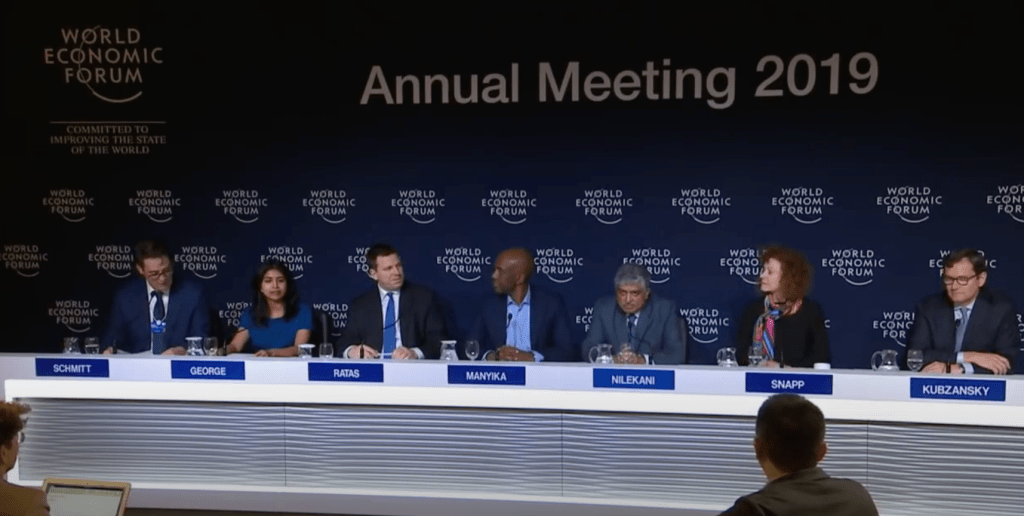
“By accelerating Africa’s digital transformation, businesses can reap the benefits,” the World Economic Forum (WEF) proclaimed in a 2020 article titled, “Africa has the potential to boost global growth.”
“There will […] be lucrative opportunities in Algeria, Angola, Ethiopia, Ghana, Kenya, Morocco, Sudan, and Tunisia … a good bet for companies seeking to enter new markets,” the WEF advised.
As the World Economic Forum recently wrote, “COVID-19 has highlighted the advantages of creating a digital economy.” Yet the advantages the group speaks of will likely fall on the side of its stakeholders.
Partners of the World Economic Forum’s “Platform for a Good Digital Identity ” include the biometric ID firm Accenture, Amazon, Barclays Bank, Deutsche Bank, HSBC Bank, Mastercard, the biometric technology firm Simprints, and the credit giant, Visa.
The initiative’s stakeholders represent the key beneficiaries of a biometric ID system imposed on the Global South, with Western multinational financial firms functioning as the gateway for its inhabitants to participate in the global economy.
The WEF has also made clear that the “end goal” of its agenda is expanding the model it established in India until every person in the world holds a unique digital ID.
In an article titled “Digital ID is the Catalyst of Our Digital Future,” Mohit Joshi, a WEF ‘young leader,’ argued that “governments should use [Aadhaar] to streamline the delivery of services and payments, and massively increase financial inclusion.”
In a separate paper, however, the WEF conceded that the new digital system will not necessarily provide users with the liberation they have been promised: “Fourth Industrial Revolution digital identity will determine what products, services, and information we can access – or, conversely, what is closed off to us,” the WEF stated.
ID2020 leverages vaccinations to push “beyond dystopian” digital ID’s and payments
Back in 2016, Bill Gates’ Global Alliance for Vaccines and Immunization (GAVI), Microsoft, Accenture and the Rockefeller Foundation established a new consortium to provide digital ID certificates to infants when they receive their routine immunizations. They called it ID2020, incidentally naming it for the year that a global pandemic would be declared.
ID2020 says it is “dedicated to spearheading a global digital biometric identity standard,” and claims Digital IDs will lead to
Related posts:
Views: 0
 RSS Feed
RSS Feed

















 October 24th, 2021
October 24th, 2021  Awake Goy
Awake Goy  Posted in
Posted in  Tags:
Tags: 
















